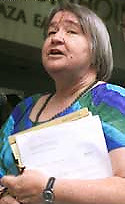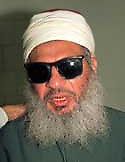—Molly McDonough

Lynne Stewart —photo © AP
The indictment this week of Manhattan criminal defense attorney Lynne F. Stewart sent shock waves through the legal community. Charges alleging Stewart conspired with a client to aid an Egyptian-based terrorist group linked to al-Qaida are raising concerns that the government is targeting lawyers who take on controversial cases.
Dozens of Stewart’s colleagues crowded the federal courtroom Tuesday as US District Judge John G. Koeltl arraigned the 62-year-old Stewart. Prosecutors contend that she and three others helped Sheik Omar Abdel-Rahman pass messages to the media and to leaders of a terrorist organization he once led known as the Islamic Group.
“We’re pretty outraged, as we think everybody in the legal community should be,” says Manhattan attorney Susan V. Tipograph, who represents Stewart. “This is really an attack, not just on Lynne, but on all lawyers who want to represent their clients in an ethical and constitutional manner.”
Yet Irwin H. Schwartz, president of the National Association of Criminal Defense Lawyers, says it remains to be seen whether lawyers should be outraged about the Stewart indictment. “Anytime that a lawyer is indicted for the acts arising from representation of a client, we are concerned,” says Schwartz, of Seattle. The question, he says, is whether this is a legitimate prosecution or an effort to chill the defense function. “It’s too early to tell.”
Stewart is accused primarily of violating a special administrative measure, known as a SAM, imposed on Adbel-Rahman, limiting his access to the mail, media, telephone and visitors to prevent him from further plotting against US interests. Stewart was required to sign the SAM to continue contact with her client. She allegedly violated the measure by conspiring with Abdel-Rahman’s interpreter to pass messages to an Islamic Group leader in New York and the former head of the London-based Islamic Observation Center.

Sheik Abdel Raman photo © AP
The indictment accuses Stewart of allowing discussions about whether the Islamic Group should continue to comply with a cease-fire of terrorist activity in Egypt and then announcing to the media that Abdel-Rahman was withdrawing his support for the cease-fire.
New York lawyer Sam A. Schmidt, who defended Wadih El Hage, one of four men convicted in the 1998 bombings of the US embassies in Kenya and Tanzania, also has had to sign a SAM and says he was troubled by it. Moreover, he says such agreements give lawyers little guidance on when their communications with clients cross the line and become crimes.
“I try to follow the law, and I think I am following the law,” Schmidt says. “But these things are so broad and vague that if the government wants to go against me, it can. It’s frightening what they can do, because they don’t have to win to destroy a life.”
Because Stewart is charged with conspiracy, the government essentially needs to prove only that she agreed to an illegal plot, even if she was unaware of its details and its ultimate goal, or didn’t know all of the co-conspirators. “Innocent people are getting swept up by association,” Schmidt says.
This is not the first time Stewart has faced criminal charges. In a reported effort to save her law license, Stewart pleaded guilty in March 1999 to misdemeanor criminal contempt because she refused to testify before a grand jury about a fee arrangement with a client.
Known for taking on unpopular clients, Stewart represented Abdel-Rahman in a 1995 trial in which he was convicted of seditious conspiracy to bomb New York City landmarks. He was linked to the 1993 bombing of the World Trade Center and in early 1996 was sentenced to life imprisonment.
Two years later, the government obtained court approval to monitor Abdel-Rahman’s conversations, including those with Stewart. The indictment covers three years of contact between Stewart and her client, who is a blind diabetic and is serving out his sentence at the Federal Medical Center in Rochester, Minn.
The indictment has many of Stewart’s friends and longtime associates coming to her defense.
Fellow New York lawyer Ron Kuby describes Stewart as a brilliant advocate who finds redeeming value in her often oppressed clients and who looks more like a beloved aunt or grandmother than a terrorist.
“The idea underlying the indictment is that Lynne Stewart worked toward assisting the Islamic Group, which is absurd,” says Kuby, who is Abdel-Rahman’s former lawyer. “She doesn’t wear a burqa, she wears a Mets cap.”
Kuby wondered why, if Stewart’s activities were perceived as such a threat, the government didn’t do something sooner. “It’s not as if she’s accused of transmitting some coded message to associates,” he says. “If this was such a major concern in the fight against terrorism, why wasn’t she arrested a year-and-a-half ago when she made the statement to the press?”
Kuby maintains that, at most, the government is hinging its case on allegations that Stewart lied to the media about whether prison officials were withholding treatment for Abdel-Rahman’s diabetes and that she helped her client find out and respond to events in the world. “Notwithstanding the government’s desire to entomb Sheik Omar, [Stewart’s alleged conduct] is not generally considered to be aiding and abetting terrorism,” says Kuby.
But during his announcement of the indictments, Attorney General John Ashcroft had a different assessment. He said inmates such as Abdel-Rahman were attempting to subvert the system of justice for terrorist ends. He mentioned that the al-Qaida training manual instructs recruits on how to continue terrorist operations from behind bars.
Ashcroft said the Stewart case opens the door for federal officials to begin using his October 2001 administrative rule allowing for monitoring of conversations between Adbel-Rahman and his lawyers without the further need of court approval.
“The government is attempting to set a precedent that it’s OK to impede attorney-client communication,” says Tipograph. She adds that the Justice Department increasingly wants to be involved in attorney-client communications and is looking to “frighten those who take on controversial cases.”
Miami lawyer Neal R. Sonnett, a former federal prosecutor and past chair of the ABA’s Section on Criminal Justice, says he finds the charges “extraordinary” because “it doesn’t appear as though there are strong allegations that she facilitated illegal activities.”
The government seems to be punishing Stewart for the nature of her client’s speech, says Sonnett. “If her client was calling for an end to terrorism, do you think she would have been charged with a crime?” he asks.
Yet while First Amendment issues may arise regarding Stewart’s and the sheik’s political speech–a strategy that failed in Abdel-Rahman’s trial–Schmidt points out that she still signed the agreement and may get stuck with the consequences of breaking it.
“It’s against the law, whether she agrees with it or not, and that’s problematic,” Schmidt says. “Still, it seems to me to be more of a contempt issue rather than something to do with a conspiracy.”
After pleading not guilty, Stewart was released on a $500,000 personal recognizance bond signed by her and her three adult children, one of whom practices with her in New York.
